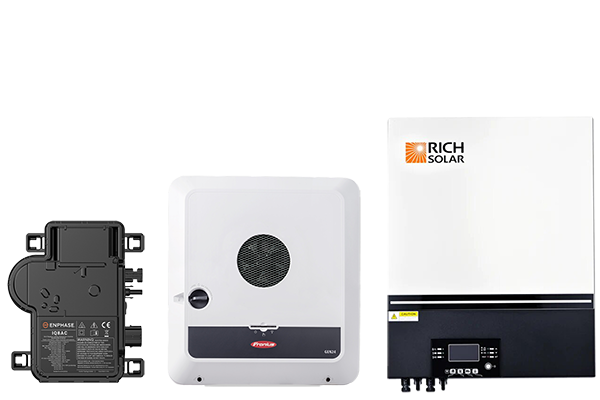Introduction to Solar Inverters
Inverters are often described as the "brains" of a solar power system. These devices communicate between your solar panels and your home, converting DC (Direct Current) power generated by your panels into AC (Alternating Current) used to run your appliances.
Shop Inverters By Type
There are two main types of inverters: micro-inverters and string inverters, with the option to add power optimizers to string inverters for better performance in shaded conditions.
String Inverters
A string inverter is a central unit with connection hubs for a "string," or group, of solar panels. Typically, 6-12 solar panels are connected to one inverter, depending on the wattage of the panels and the capacity of the inverter.
String inverters are simple and cost-effective, with fewer parts to purchase and maintain. They are ideal for systems with full exposure to sunlight.
However, their output falls behind if shade is an issue, because shade on one panel can hinder the performance of the entire string. String inverters work best when there are no obstructions to your panels.
Micro-Inverters
The output of string inverter systems falls behind if the solar panels are blocked by shade, snow, or other obstructions. In those cases, micro-inverters are a more efficient solution.
Micro-inverters work by pairing a small inverter unit to each solar panel in the system. These units monitor and control system performance on a panel-by-panel basis, so if shade falls on one of your panels, the rest of your system remains unaffected.
Not only are micro-inverters more efficient in shaded conditions, they are more expandable, as well. Adding on to your system is as easy as adding another panel+micro-inverter pairing down the line. With string inverters, you can run into headaches re-wiring and re-balancing strings, which have to have an equal number of panels in each string.
Choose micro-inverters if you'd like to mitigate shade issues, or have plans to expand your system down the line.
Shop Inverters By Application
Our selection of inverters are specially designed to tackle a wide variety of situations.
Grid-Tie Inverters
Grid-tied inverters are used in systems that are connected to the utility grid. These inverters synchronize with the grid to store energy generated by the solar panels. Under an agreement with the utility company, the system owner generates credits for the electricity they produce, which can reduce or eliminate their monthly electric bill.
Off-Grid Inverters
Off-grid inverters are used in systems that are not connected to the utility grid. They are designed to interface with a battery bank to store energy locally, where it can be used to power your home when the sun isn't out (at night, or during inclement weather).
Hybrid Inverters
Hybrid inverters are for systems that connect to the utility grid for energy bill savings, while also adding a source of backup power to protect against outages. Hybrid inverters interface with your solar panels, batteries, the grid, and any backup power sources like a gas generator, ensuring everything runs together smoothly. While these all-in-one solutions cost a bit more, the versatility is unmatched.

Questions about your solar project?
Get fast answers from real people. We'll work together to design the perfect DIY solar kit for your project. Call (866) 391-0432 for immediate assistance (M-F, 6am-4pm PST), or click below to request a custom quote.
Request a Quote
